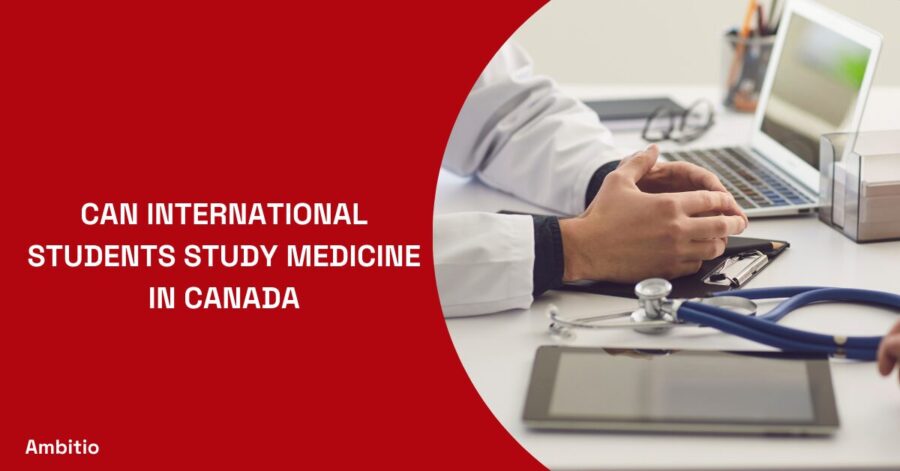13 December 2024
6 minutes read
Navigating the Pathway: International Students Studying Medicine in Canada

Introduction
In recent years, Canada has emerged as a premier destination for international students, especially those aspiring to pursue a career in medicine. The country’s esteemed universities, innovative medical programs, and multicultural ethos make it an attractive option for students from around the globe. This comprehensive guide aims to shed light on the various aspects of studying medicine in Canada as an international student.
A Gateway to World-Class Medical Education for International Students
Canada boasts a robust healthcare system and a reputation for academic excellence in medical education. International students considering an MBBS or other medical degrees in Canada are stepping into a world of opportunities, where quality education meets cutting-edge research and clinical practice.
The Landscape of Medical Education in Canada for International Students
Medical education in Canada is characterized by its high standards and rigorous curriculum. The journey to becoming a doctor in Canada typically starts with a Bachelor’s degree, followed by a four-year medical program leading to a Doctor of Medicine (MD) degree.
International students need to adapt to the intense and demanding nature of these programs, which are designed to develop skilled, knowledgeable, and compassionate healthcare professionals.
Exploring Undergraduate Medical Education
For those starting their medical journey, undergraduate programs in health sciences or pre-medical tracks are popular choices. These programs lay the groundwork for a strong application to medical school, focusing on subjects like biology, chemistry, and physiology.
International students must excel in these courses and participate in extracurricular activities, such as volunteer work and research, to enhance their medical school applications.
Navigating the Medical School Application Process
The application process for medical school in Canada can be daunting, especially for international students. It involves submitting academic transcripts, scores from the Medical College Admission Test (MCAT), letters of recommendation, and a compelling personal statement.
Additionally, many universities conduct interviews to assess candidates’ suitability for a career in medicine. Preparation and thorough research into each medical school’s requirements are crucial for success.
Specialized Medical Programs and Postgraduate Opportunities
After obtaining an MD, students often pursue residency programs, which provide specialized training in areas like surgery, pediatrics, or psychiatry. These postgraduate programs are highly competitive and require students to demonstrate both academic excellence and practical competence.
Pursuing Specialization in Canadian Medical Schools
Specialization in Canada involves applying for residency positions through a matching process. International medical graduates may face additional challenges, such as varying eligibility criteria and limited positions.
However, those who secure a residency gain invaluable experience in Canada’s diverse healthcare settings, working alongside some of the best medical professionals in the world.
Research and Fellowship Opportunities
Canadian medical schools also offer extensive research opportunities and fellowships. These programs allow students to contribute to groundbreaking medical research and gain expertise in niche areas of medicine. International students interested in research can leverage these opportunities to enhance their medical education and career prospects.
Financial Considerations for Studying Medicine in Canada
Studying medicine in Canada is a significant financial commitment. International students must consider tuition fees, living expenses, and other associated costs, such as textbooks and medical insurance.
Understanding Tuition and Expenses
Tuition fees for international students are generally higher than for Canadian residents. Additionally, living in cities like Toronto or Vancouver can be expensive.
Students should budget for housing, food, transportation, and other personal expenses. Many universities offer detailed cost breakdowns on their websites, helping students plan their finances effectively.
Scholarships and Financial Aid
Navigating the financial aspects of studying medicine in Canada is a significant concern for many international students. While medical education in Canada is known for its high quality, it is also associated with substantial tuition costs.
Fortunately, there are several scholarships and financial aid options available that can help mitigate these expenses. This section will explore the various financial support systems that international students can access to ease the burden of tuition fees and living expenses while studying medicine in Canada.
University-Specific Scholarships
Many Canadian medical schools offer scholarships specifically for their international students. These scholarships can be based on merit, financial need, or a combination of both.
It’s crucial for prospective students to research the scholarships available at the universities they are interested in. For instance, the University of Toronto offers the Lester B. Pearson International Scholarship, which covers tuition, books, incidental fees, and full residence support for four years. Similarly, other universities have their own range of scholarships, each with its unique eligibility criteria and application process.
External Scholarships and Bursaries
Apart from university-specific scholarships, there are numerous external scholarships available for international students. These are offered by private organizations, charities, and government bodies.
For instance, the Canadian Commonwealth Scholarship Program funded by the Government of Canada offers scholarships to students from Commonwealth countries.
Similarly, the Vanier Canada Graduate Scholarships are available for doctoral students, including those in medical fields. Students should actively seek out these opportunities and apply well before deadlines.
Institutional Financial Aid
Some medical schools in Canada provide need-based financial aid to international students. This aid is typically awarded based on the student’s financial situation and the cost of the program.
Financial aid packages may include grants, loans, or a combination of both. Students should contact the financial aid office of their chosen university to understand the types of aid available and the application process.
International Student Loans
International students can also consider applying for student loans. In some cases, Canadian banks offer student loans to international students who have a Canadian citizen or permanent resident as a co-signer.
Additionally, students should explore loan options available in their home country. Some governments offer educational loans to students who wish to study abroad, which can be a viable option to finance their education in Canada.
The Experience of International Medical Students in Canada
Studying medicine in Canada is not just about academics; it’s an immersive experience that shapes future doctors. International students experience a multicultural environment, practical learning experiences, and the chance to build a global network.
Embracing Cultural Diversity and Inclusivity
Canadian universities are known for their diverse and inclusive campuses. International students get to interact with peers from various cultural backgrounds, enhancing their understanding and empathy – key qualities for any medical professional. This diversity also extends to patient care, as students learn to navigate a multicultural healthcare environment.
Access to Advanced Healthcare Facilities
Canada is home to some of the world’s most advanced healthcare facilities, offering students the opportunity to train with cutting-edge technology and methodologies.
Clinical rotations and internships form a core part of medical education in Canada, allowing students to apply their knowledge in real-world settings under expert guidance.
Career Prospects and Pathways after Graduation
The completion of a medical degree in Canada opens a multitude of doors for international graduates, both within Canada and globally. The pathway a graduate takes can vary greatly based on personal preference, the regulations of their home country, or the opportunities available in Canada. Here, we delve into the diverse career prospects and pathways available to these graduates.
Licensing and Practice in Canada
For those wishing to continue their medical career in Canada, the first step is obtaining a license to practice. This process involves passing the Medical Council of Canada Qualifying Examinations (MCCQE) and completing a residency program.
The MCCQE is a two-part exam that assesses the candidate’s medical knowledge and clinical skills. Successfully passing these exams is crucial and requires intensive preparation.
Navigating the Canadian Residency Match
After obtaining the MD degree, graduates must enter the Canadian Resident Matching Service (CaRMS). This process matches graduates with residency programs across Canada.
International graduates might find this competitive, as preference is often given to Canadian citizens or permanent residents. However, with a strong academic record and relevant clinical experiences, international graduates can secure a place in these coveted residency programs.
Obtaining a Medical License
Post-residency, graduates must apply for a medical license from the province or territory where they intend to practice. Each region in Canada has its own medical regulatory authority with specific requirements.
It’s essential for graduates to familiarize themselves with these regional requirements. Once licensed, doctors can either enter general practice or continue further specialization, which can take additional years of training.
Global Opportunities and Returning Home
Canadian medical degrees are highly valued worldwide, providing graduates with international career opportunities. However, international graduates planning to return to their home country or practice elsewhere must navigate the medical licensing requirements and recognition processes of those countries.
Transitioning to Medical Practice in Home Countries
For those returning to their home countries, the transition involves understanding and complying with the local medical licensing regulations. This often includes passing local medical board exams and completing any required internships or training programs.
The high standard of Canadian medical education is generally well-regarded, which can facilitate this transition and open opportunities in various healthcare settings.
Pursuing Opportunities in Third Countries
Some graduates may choose to work in countries other than Canada or their homeland. This path can provide unique experiences and exposure to different healthcare systems.
However, it requires understanding the specific medical qualifications and licensing requirements of the chosen country. This path can be especially appealing to those looking to work in international healthcare, public health, or global health initiatives.
Conclusion
For international students, pursuing medical education in Canada is a journey filled with challenges, learning, and immense rewards. It demands dedication, resilience, and a passion for medicine.
With its world-class universities, diverse clinical experiences, and supportive academic environment, Canada continues to be a leading destination for aspiring medical professionals from around the globe.
FAQs
How competitive is it to get into a Canadian medical school as an international student?
Admission to Canadian medical schools is highly competitive, with stringent academic and extracurricular requirements. International students also compete for a limited number of spots designated for them.
Can international medical graduates practice in Canada immediately after graduation?
No, they must first pass the licensing exams and complete a residency program in Canada.
How long does it take to complete medical education in Canada?
It usually takes 4 years to complete an MD program, followed by 2-5 years of residency training, depending on the specialization.
Are there part-time work opportunities for international medical students in Canada?
Yes, many universities allow students to work part-time, although the rigorous nature of medical programs may limit the time available for work.
Is proficiency in French necessary for studying medicine in Canada?
Proficiency in French is required for programs in French-speaking regions like Quebec, but most programs are in English.

You can study at top universities worldwide!
Get expert tips and tricks to get into top universities with a free expert session.
Book Your Free 30-Minute Session Now! Book a call now




























